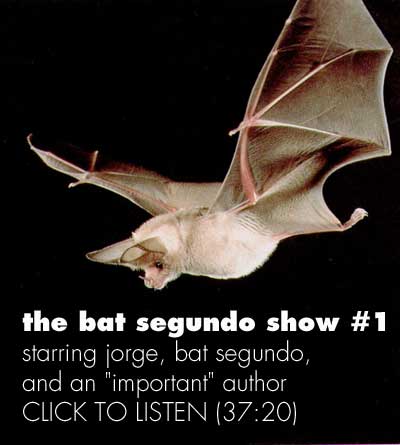As reported elsewhere , this week’s NYTBR has not only been redesigned (of which more anon), but features a list of “pure creatures of the Internet”. What strikes me initally about David Orr’s article is how much it misrepresents online literary coverage and litblogs as a whole. Orr vilifies “the worst lit bloggers,” who “sound like what you’d get if you seated the title characters from ‘Heathers’ around the Algonquin Round Table and gave them a photo of Zadie Smith on a bad hair day.” (Gee, like we haven’t heard this before.) Never mind that Joe Queenan’s review of A.L. Jacobs’ The Know-It-All contains an equally snarky tone (and let’s face it, you don’t hire Queenan unless you have an axe to grind) or that the print reader is urged, just underneath the list of contributors, to go to the Times website to “connect to the Web sites in David Orr’s essay,” as if typing a URL into a browser were some unthinkable act of Euclidean geometry. Furthermore, Orr condemns Maud Newton for having the effrontery to indulge in “the chronic vice of blogs — has she mentioned her fellow bloggers? And how clever they are? And how she really, really likes them?” This when Dennis Loy Johnson has thoroughly documented the ongoing Times circlejerk and when Deborah Friedell can’t refrain in the same issue from using David Brooks as a comparative example (as if Brooks were the only conservative columnist writing today). And then there’s Neil Genzlinger’s bulleted approach to books, conspicuously culled from the humorous bulleted lists found so frequently at Old Hag, Gawker and TMFTML over the past year.
 But more importantly, there’s the myth and hype of this impotent redesign, which has been carefully tailored to create less column inches for books and foster an illusion of pith (this week’s NYTBR runs 40 pages, although 10 of them are full-page ads) — all this while leaving fiction (and, in particular, literary fiction and poetry) in the dust heap. If you compare today’s NYTBR with previous issues, you will now find sidebar quotes taking up a full column to the left or right of the reviews, as well as more room for (yes, you guessed it!) ads. In addition, the accompanying photos are much larger. Whether this was Bill Keller or Sam Tanenhaus’s idea, it’s difficult to say, though I suspect that this had something to do with Keller’s concerns w/r/t the Almighty Dollar.
But more importantly, there’s the myth and hype of this impotent redesign, which has been carefully tailored to create less column inches for books and foster an illusion of pith (this week’s NYTBR runs 40 pages, although 10 of them are full-page ads) — all this while leaving fiction (and, in particular, literary fiction and poetry) in the dust heap. If you compare today’s NYTBR with previous issues, you will now find sidebar quotes taking up a full column to the left or right of the reviews, as well as more room for (yes, you guessed it!) ads. In addition, the accompanying photos are much larger. Whether this was Bill Keller or Sam Tanenhaus’s idea, it’s difficult to say, though I suspect that this had something to do with Keller’s concerns w/r/t the Almighty Dollar.
The overall impression I have is a Times graphic designer trying to justify shorter reviews as “full-length reviews” with previous full-length reviews (crossing over 1,000 words) now stretched across two pages.
Don’t believe me? Okay, if you have the Times in your hand, it’s time to grab some scissors and tape. Take Zoe Heller’s review of The Surrender and cut out each column on pages 36 and 37. Ignore the bigass Toni Bentley picture altogether. You’ll find that you can place the entire text comfortably on one full page. (And as an aside: why have Zoe Heller giving press to Wieseltier’s well-documented fetish when she could have tackled a more intriguing memoir such as Valerie Hemingway’s upcoming Running with the Bulls?
This is the NYTBR‘s new direction in a nutshell: lurid sensationalism, spotty coverage for fiction (averaging at 1,322 words a book for seven titles, including the longass Roth review), almost nothing for poetry or literary endeavors, and gonad-hard coverage for nonfiction (averaging at 794 words a book for fifteen titles, including the Genzlinger roundup).
WORD COUNTS:
Fiction:
The Plot Against America: 5,571 words
Human Capital: 846 words
Crime Coverage: 1,014 words (a mere 3 books, which includes the new Ian Rankin and Alexander McCall Smith!)
The Love Wife: 779 words
The Curse of the Appropriate Man: 1,049 words
Nonfiction:
Will in the World: 1,759 words
America (the Book): 1,584 words
The Surrender: 1,546 words
The Last Night of the Yankee Dynasty: 1,313 words
Osama: 1,281 words
The Know-It-All: 1,137 words
Copies in Seconds: 717 words
The God of Driving: 721 words
Laughing Without Guilt roundup: 1,846 words (for 7 books)
Let’s compare this with the September 15, 2002 issue, shall we?
Fiction:
Dancing with Hens: 328 words (Books in Brief)
Fresh Eggs: 258 words (Books in Brief)
Logan’s Storm: 306 words (Books in Brief)
Last Night: 291 words (Books in Brief)
Dear Mr. President: 284 words (Books in Brief, first novel)
Skirt and Fiddle: 275 words (Books in Brief)
In the Middle of All This: 851 words
Pronek is Illuminated: 1,232 words
The Art of Seeing: 759 words
Middlesex: 1,473 words
The Crimson Petal and the White: 1,185 words
Selected Poems by Mona Van Duyn: 1,040 words
One Man’s Bible: 1,155 words (from Nobel-winning Chinese writer Gao Xingjian)
Gorgeous Lies: 1,177 words (first novel)
Nonfiction:
First in War: 1,409 words
The Immortal Dinner: 1,197 words
Neon Metropolis: 1,185 words
A Brilliant Solution: 1,123 words
Ghosts of the Fireground: 1,078 words
The Normal One: 1,096 words
Inventing America: 1,068 words
Sopranos book roundup: 1,447 words
Brotherhood of the Bomb: 1,408 words
Why Terrorism Works: 1,507 words
Living at the Edge: 1,200 words
Sky Blue Trades: 1,083 words
Rocky Marciano: The Rock of His Times: 1,116 words
We had our quibbles with Chip McGrath, but for those not keeping score, that’s 14 fiction titles and 13 nonfiction titles. And McGrath’s fiction coverage includes two hot titles, two first novels, and a Chinese fiction writer.
But here are some more interesting comparative stats:
Number of words devoted to review coverage in October 3, 2004 issue: 21,163
Number of books covered in October 3, 2004 issue: 22
Number of words devoted to review coverage in September 15, 2002 issue: 26, 529
Number of books covered in September 15, 2002 issue: 27
Let’s ask ourselves a few questions:
- Would Aleksandar Hemon have been recognized with an MacArthur grant if he didn’t get the 9/15/2002 coverage?
- Would The Crimson Petal and the White or Middlesex transformed into the phenomenons that they became without the 9/15/2002 coverage?
- Would Gao Xingjian be as well-known in the States without the 9/15/2002 coverage?
- Is this week’s NYTBR fiction slate really all that different from the new books pile at Barnes & Noble?
We’ve heard promises and pledges from Tanenhaus before that fiction was a priority, but it’s clear with these new changes that he’s living in a world where storytelling and poetry no longer matter, save only through the strange “FICTION” placards Tanenhaus might occasionally see at bookstores. It’s one thing to single out neglected titles alongside the Best Sellers list (of which, we whole-heartedly approve). It’s another thing to reduce said coverage to Entertainment Weekly-sized blurbs while deferring fiction reviews to a book with built-in sales like The Plot Against America that, frankly, doesn’t need another 5,000 word review. Until Tanenhaus can demonstrate that the NYTBR contains book coverage that truly reflects “all the news that’s fit to print,” we will deny him any and all tasty brownies cooked in the oven. And that includes the ones that Toni Bentley might be baking.
 You’re a moribund NYT journalist who can’t even treat
You’re a moribund NYT journalist who can’t even treat 

 But more importantly, there’s the myth and hype of this impotent redesign, which has been carefully tailored to create less column inches for books and foster an illusion of pith (this week’s NYTBR runs 40 pages, although 10 of them are full-page ads) — all this while leaving fiction (and, in particular, literary fiction and poetry) in the dust heap. If you compare today’s NYTBR with previous issues, you will now find sidebar quotes taking up a full column to the left or right of the reviews, as well as more room for (yes, you guessed it!) ads. In addition, the accompanying photos are much larger. Whether this was Bill Keller or Sam Tanenhaus’s idea, it’s difficult to say, though I suspect that this had something to do with Keller’s concerns w/r/t the Almighty Dollar.
But more importantly, there’s the myth and hype of this impotent redesign, which has been carefully tailored to create less column inches for books and foster an illusion of pith (this week’s NYTBR runs 40 pages, although 10 of them are full-page ads) — all this while leaving fiction (and, in particular, literary fiction and poetry) in the dust heap. If you compare today’s NYTBR with previous issues, you will now find sidebar quotes taking up a full column to the left or right of the reviews, as well as more room for (yes, you guessed it!) ads. In addition, the accompanying photos are much larger. Whether this was Bill Keller or Sam Tanenhaus’s idea, it’s difficult to say, though I suspect that this had something to do with Keller’s concerns w/r/t the Almighty Dollar.